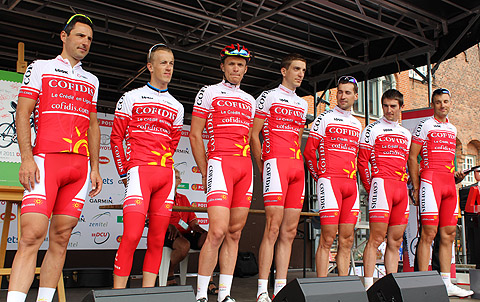Clement Venturini (Cofidis) proved that he is a huge sprint talent by taking his first major pro win on stage 3 of the Tour of Austria. In a technical, dangerous finale, he easily beat Andrea Pasqualon (Roth) and Sjoerd van Ginneken (Roompot) and moved into second in the overall standings. Pasqualon is the new leader after Nicola Ruffoni (Bardiani) was dropped on the final climb.
Clement Venturini is mostly known for his cyclo-cross skills as he has been one of the leading French riders in the off-road discipline. However, he is also a very capable road sprinter and this year he has enjoyed a bit of a breakthrough on the biggest scene.
With numerous top 10 results, including a second place in the Coupe de France race Route Adelie de Vitré, Venturini has been knocking on the door for a breakthrough victory for a long time. He has firmly established himself as number 2 behind Nacer Bohúhanni in the Cofidis sprint hierarchy and today he finally opened his account on stage 2 of the Tour of Austria.
Venturini made use of more than just his pure speed to come away with the victory as the mostly flat stage turned out to be harder than expected. A few climbs in the finale created a selection and then Venturini benefited from his technical skills in a very technical, cobbled finale.
After yesterday’s sprint stage, the fast finishers were expected to be back in action on stage 2 which could be the final chance for them in this year’s race. The 205.5km between Mondsee and Steyr included a category 2 climb at the 73.8km mark and 2562m of climbing but the roads were predominantly flat. There were a few rolling hills in the finale but the final kilometres were flat.
Nico Brüngger (Roth) was the only non-starter when the peloton gathered in Mondsee under a sunny sky. Like yesterday, they got the race off to a very aggressive opening phase but after 10km of racing, it looked the break had been formed when Maxat Ayazbayev (Astana), Clement Koretzky (Vorarlberg) and Andreas Graf (Hrinkow) escaped. However, they only enjoyed 8km of freedom and at the 18km mark, the attacking could start again.
Quentin Pacher (Delko) beat Anthoy Perez (Cofidis) and Alessandro Vanotti (Astana) in the first intermediate sprint at the 21.1km mark before the attacks continued. Finally, four riders managed to escape and after 33km of racing, Jacek Morajko (Wibatech), Arthur Ershov (Gazprom), William Clarke (Drapac) and Helmut Trettwer (WSA) had built at gap of one minute.
Morajko beat Ershov and Trettwer in the second KOM sprint and then the quartet worked together to extend their lead. It was 3.10 at the 55km mark and 3.30 ten kilometres later but the Bardiani team of race leader Nicola Ruffoni was reluctant to give them too much of an advantage. When Morajko beat Trettwer and Ershov in the only KOM sprint, the gap was still only 3.50.
At the 100km mark, the leaders had a lead of just 3.10 and Bardiani was leaving nothing to chance after yesterday when they almost failed to catch the break. 25km later they had reduced the advantage to just 2.15 and when Astana also came to the fore, they had it down to just 1.40 after 152km of racing.
Trettwer beat Morajko and Clarke in the final intermediate sprint before Ershov was dropped after 175km of racing. At this point, the peloton had slowed down a bit after initially having reduced the gap to a minute. When Patrick Gamper (Tirol) tried to bridge across, it was again 1.20.
Gamper dangled 30 seconds behind the leaders for a long time but he never made the junction. He was brought back as they hit a small climb with 25km to go and here the peloton went so fast that the three leaders were also swallowed up.
Bardiani continued to ride on the front until they hit a small climb with 20km to go. Here Marek Rutkiewicz (Wibatech) and Stephan Rabitsch (Felbermayr) took off. They got an advantage of 15-20 seconds but as several sprint teams were now collaborating, they were brought back during the next 5km.
James McLaughlin (Felbermayr) was the next to try but he failed to stay clear. The peloton was in full control but a small climb inside the final 10km made it split up, with several riders losing contact. Race leader Ruffoni was among them and he ended the stage with a time loss of 2.07.
However, most of the sprinters had survived and it was Roth that took control in the finale. However, their sprinter Andrea Pasqualon was beaten convincingly by a superior Clement Venturini who excelled in the technical and cobbled finale. Sjoerd van Ginneken (Roompot) was third.
With Ruffoni unable to contest the sprint and losing time, Pasqualon could console himself with the fact that he moves into the race lead with a 4-second advantage over Venturini. However, he will lose the jersey in stage 3 which has the first uphill finish in the race. The 181.3km Ardagger and the Sonntagberg have 3084m of climbing so it is not a big mountain stage but the finale is difficult. There are two tough category 2 climbs in the first half and then the road levels out. However, it is all just a warm-up for the finish on the category 3 climb of Sonntagberg (3.9km, 8.6%). It’s a tough climb with a maximum gradient of 20% and which has a very steep first section and steep cobbled finale.
| Tekau HAPAIRAI 47 years | today |
| Yuan WEI 36 years | today |
| Cristina MARTINEZ BONAFE 29 years | today |
| Ismael COLLADO 34 years | today |
| Ales REHOR 36 years | today |
© CyclingQuotes.com









